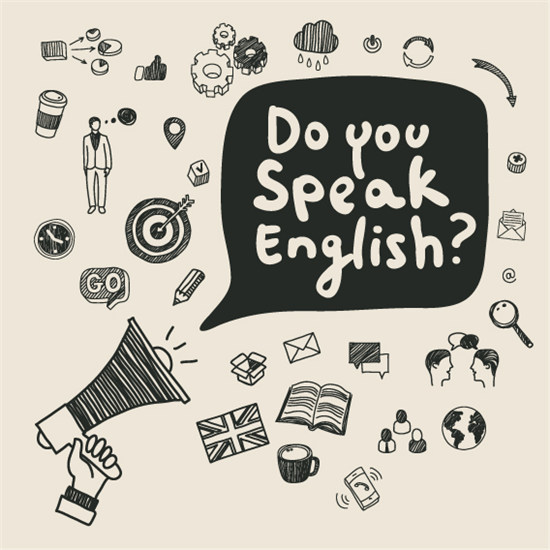- 外语留学
-
外语交流遇到陌生单词怎么才能不尴尬?
时间:2016/5/17 17:23:13 作者:王宝珠 来源:中国培训之家 阅读:1165 评论:0每一个学习外语的人在和老外交流时最担心的事情就是遇到陌生单词怎么办?当你在用还没有完全掌握的语言和别人交谈时,突然会记不得一个词,或者你意识到还没有学过这个词,然后谈话过程就中断了,打乱了你正常表达的节奏。你的同伴此时会看着你的眼睛,希望可以找到你想谈论的东西,但他们看到的只是惊慌失措。其实,对于已经熟练掌握一门语言的人来说这已经不是一个问题了,虽然他们偶尔也可能在交谈中遇到陌生的单词,但即使有陌生的单词,他们也不会轻易的闭嘴。遵循以下5点,你将再也不会无言以对。

1。多进行单词联想
Here are some tips to help bolster word memorization: Learn new words and their synonyms。 Learn how to describe new words in your learning language。 Instead of simply translating a word from your native language into your learning language, these techniques help you associate a new word with other words in the same language。
这有一些提示来帮助巩固词汇的记忆:学新单词和它们的同义词。试着用你学习的语言来描述新单词。这些技能帮助你用外语把新单词和其他单词联系起来,而不是简单地用你的母语翻译成你学习的语言。
Put these word connections into practice with a little improve training。 You and your friends can play games like “who can describe a concept with the fewest words”, or, when you’re by yourself, you can write down as many word associations as possible。 This way, when you forget a word in a real conversation, you’ll have plenty of other associations to fall back on。 You’re likely to remember one of the synonyms or at least be able to describe what you mean in different words — without having to access your native language for help。
通过一些提高性训练,把单词联系方法付诸实践。你和同伴们可以玩“谁能用最少的文字描述一个概念”这个游戏,或者,当一个人的时候,你可以尽可能多地写下单词联想。当你在现实对话中忘记一个单词的时候,你就会有很多其他联想到(的单词)来帮忙。你可能会想起一个同义词或至少能用其他单词来描述你的意思,而不必求助于你的母语。

2。 Just guess
2。猜一猜
Over 30% of English vocabulary was adopted from French, so if you’re speaking French to someone and you suddenly draw a blank, take a chance and “Frenchify” an English word。 There’s a good chance that what you say will at least be a close approximation of a real French word。 This trick also works for the other Romance languages — like Spanish, Portuguese and Italian — since these languages use words with the same Latin roots as French words。 Because most of English vocabulary derives from middle German, this trick can work when speaking German and Dutch as well。
超过30%的英语词汇来源于法语,所以如果你用法语和人交谈,突然想不起来(怎么说),抓住机会“法语化”一个英语单词。很有可能你所说的和一个真正的法语单词非常接近。这个技巧同样适用于其他罗曼语族,像西班牙语、葡萄牙语和意大利语,因为这些语言和法语一样都用同一个拉丁语单词。大部分英语单词来源于中德,所以这个技巧对德语和荷兰语也适用。
3。 Make up words
3。造词
This is especially easy to do with languages like German where many nouns are compounds of two or three smaller words。 If you want to say glove, but don’t have an idea, just take two probable words (hand + shoe) and stick them together。 So, Handschuh is in fact the German word for glove!
对于像德语这样的语言,这个方法非常简单,因为很多名词是2个或3个小单词的复合词。如果你想说手套,但不知道怎么说,那就把两个可能的单词(手+鞋)组合在一起。看,“handschuh”就是手套的德语单词。
Even if your clever made-up word is totally not a real word, your conversation partner will find it much easier to guess what you mean。 For example, a cell phone is not a Taschentelefon (pocket-telephone), but the invented word still communicates the concept accurately enough (the Germans actually call them Handys by the way)。
即使你机智创造的单词不是一个真的词,你的对话伙伴也能更容易的猜到你的意思。比如,“cell phone”(手机)不是德语“Taschentelefon”的单词,但创造出来的单词仍然可以准确地联系到这个概念(德国人实际上管手机叫做“Handys”)。
You can also achieve a similar effect with the equivalents of vague words like “something,” “thing” which allow context to fill in the blanks。
你也可以用类似“某物”“东西等模糊的词语连接上下文,这样也能达到类似的效果。
4。 Use your body
4。运用你的肢体
Seriously, don’t underestimate the power of body language。 After all, charades might be a French word, but it’s played all over the world。 So do pantomime, make sound effects, gesticulate wildly, make shadow puppets if you need to, try anything!
说真的,不要忽视肢体语言的作用。毕竟,猜词游戏是一个法语单词,但全世界都在玩。所以,做手势、发出声音、夸大手势,做皮影反正随你需要,尝试任何方法!

5。 Say it in your mother tongue (speaking of moms)
5。说你的母语
Saying the word in your own language is not ideal, but it’s still better than saying nothing。 You can even turn it into a learning opportunity by asking — in the target language, of course — “How do you say ____ in your language?” They might not know, but it also might be the final clue they needed in order to understand you。
用母语说是最不理想的一种方法,但这也比什么都不说好。你甚至可以把它变成一个学习机会,询问(用你正在学习的语言)“ ____用你的语言怎么说?”他们可能不了解,但这也可能成为让他们明白你(的意思)的最终线索。
HOWEVER: be strict with yourself。 Only say the word you’re missing in your native language, the rest of the conversation should still be held in your target language!
但是:严于律己。只有你使用不了前四种方法表述的单词才能用母语,其他谈话仍然用你正在学习的语言(表达)。

虽然有这五个交流时的技巧,但是过硬的单词量才是你和外国人交流时重要保障,卡西欧电子辞典E-F200完整收录《牛津高阶英汉双解词典(第八版)》、《英汉大词典(第二版)》、《汉英大词典(第三版)》等六大英语综合辞书及专项英语学习辞书,多词典严谨查询,丰富的释义帮助用户更好地理解词义,掌握词汇正确用法。在权威辞典的支撑下,收录的79本权威英语学习辞书和300篇世界英文名著,也能充分满足用户的出国考试筹备及和外国人交流的需求,让你不会在交流中因为一个单词而变得哑口无言。
(部分文字源自网络)
- 相关文章
-
-
5-92016有道词典校园外语歌手大赛三强出炉 新生偶像计划正式启动
-
4-21震惊!以秒杀的方式记英语单词!!
-
3-14背单词始终是个噩梦?快速积累词汇有高招!
-
9-18有道词典助力“希望之星” 提供全程单词释义
-
- 本类更新
-
-
12-30致人大留学项目的一封感谢信
-
12-27美国东方大学:促进更多世界友人学习中国传统文化
-
12-06专注语培,格琳斯英语打造特色线上线下教学模式
-
11-11大连领我教育用一站式服务赢得众家长青睐
-
09-10剑桥为首的英国工程类名校 到底好在哪
-
08-30这所大学的建筑类专业,凭什么是全英第一?
-
08-29“成为医生,超越医生” 跟随2019级新生走进杜克-新加坡国立大学医学院
-
08-12重磅!布里斯托大学本科预科课程全新升级!
-
08-09创新智慧课堂 全面开启留学智能时代
-
08-06The Project at Hoxton 告诉你伦敦留学住哪里
-
- 本类推荐
-
-
08-202018留学读研必读:如何顺利过初筛?
-
- 本类排行
-
-
03-13中美文化差异大?Amerigo教育助力学生快速融入“全英环境”
-
02-01阿博留学为海外留学监护开了剂良方
-
02-04阿博留学告诉你互联网+的真谛
-
08-19有道学堂发布四六级考情报告:六成考生将听力列为“最头疼题型”
-
01-20美国大学留学有了新变化?学美留学第一时间重磅揭底
-
03-28最新韩国留学问题一览表
-
08-24芝加哥大学布斯商学院EMBA课程简介会将于9月在上海和北京举行
-
05-17外语交流遇到陌生单词怎么才能不尴尬?
-
01-20谁的经费在燃烧?壕爹在纽约时代广场晒儿子阿博
-
06-17维敦教育:1分钟精简2016年最新留学动向!
-



